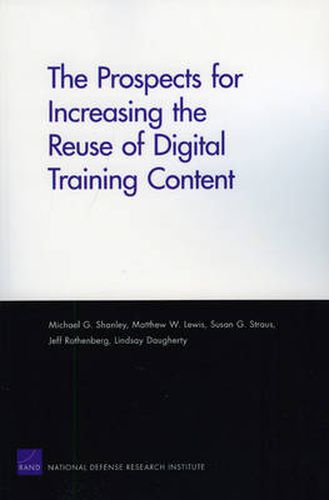Readings Newsletter
Become a Readings Member to make your shopping experience even easier.
Sign in or sign up for free!
You’re not far away from qualifying for FREE standard shipping within Australia
You’ve qualified for FREE standard shipping within Australia
The cart is loading…






RAND was asked to examine how the Advanced Distributed Learning (ADL) Initiative and the Department of Defense (DoD) more broadly might encourage the reuse of digital training content as a strategy to reduce the cost of its development. The study focused primarily on the extent to which incentives and other enablers currently are and might be used to encourage training development (TD) organizations to develop a reuse mechanism, especially one supported by repositories. Data on existing efforts to reuse digital training content were gathered from the defense, commercial, and academic sectors through semi-structured telephone interviews and site visits at large TD organizations. In addition, studies on incentive issues in the knowledge management literature and reuse efforts in the domains of software and materiel development were reviewed. Five currently used reuse strategies were identified and assessed, with the greatest emphasis on the production of reusable learning objects (RLOs) to be stored in large, searchable learning object repositories accessible to multiple organizations. Findings highlighted a number of challenges in current reuse efforts–for example, low rates of return on many investments in reuse, technical challenges with the RLO strategy that will take time to overcome, and the need to develop implementation processes for RLO reuse, including those that address disincentives to sharing within and among organizations. The study also concluded that ADL can encourage the reuse option by taking a proactive approach in supporting organizations attempting to implement a reuse strategy. For example, ADL might broaden definitions of reuse and redefine success via the use of metrics and surveys, invest in high-profile pilots and other research to identify conditions with the highest potential payoffs for reuse, and evolve its role as a trusted advisor to organizations seeking guidance on implementation.
$9.00 standard shipping within Australia
FREE standard shipping within Australia for orders over $100.00
Express & International shipping calculated at checkout
RAND was asked to examine how the Advanced Distributed Learning (ADL) Initiative and the Department of Defense (DoD) more broadly might encourage the reuse of digital training content as a strategy to reduce the cost of its development. The study focused primarily on the extent to which incentives and other enablers currently are and might be used to encourage training development (TD) organizations to develop a reuse mechanism, especially one supported by repositories. Data on existing efforts to reuse digital training content were gathered from the defense, commercial, and academic sectors through semi-structured telephone interviews and site visits at large TD organizations. In addition, studies on incentive issues in the knowledge management literature and reuse efforts in the domains of software and materiel development were reviewed. Five currently used reuse strategies were identified and assessed, with the greatest emphasis on the production of reusable learning objects (RLOs) to be stored in large, searchable learning object repositories accessible to multiple organizations. Findings highlighted a number of challenges in current reuse efforts–for example, low rates of return on many investments in reuse, technical challenges with the RLO strategy that will take time to overcome, and the need to develop implementation processes for RLO reuse, including those that address disincentives to sharing within and among organizations. The study also concluded that ADL can encourage the reuse option by taking a proactive approach in supporting organizations attempting to implement a reuse strategy. For example, ADL might broaden definitions of reuse and redefine success via the use of metrics and surveys, invest in high-profile pilots and other research to identify conditions with the highest potential payoffs for reuse, and evolve its role as a trusted advisor to organizations seeking guidance on implementation.